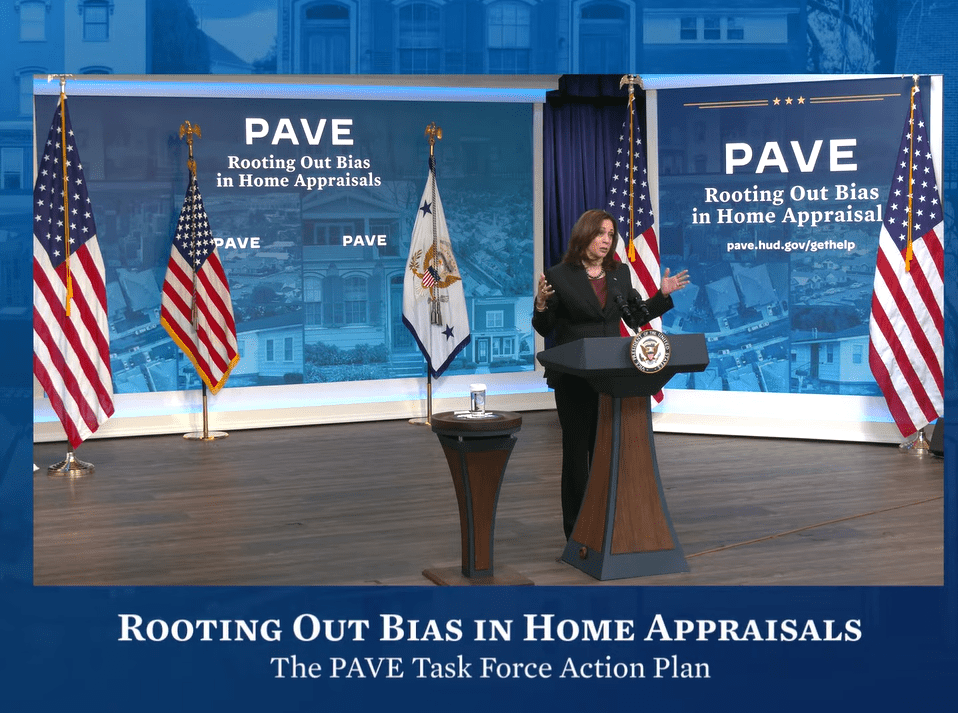Today the Interagency Task Force on Property Appraisal and Valuation Equity (PAVE) issued its action plan to root out racial and ethnic bias in home valuations, a widespread problem that helps drive the racial wealth gap. The action plan is a bold leap forward in documenting the impact of such bias and setting out specific solutions. It identifies the historical role of racism in the valuation of rental property, examines various forms of bias in property valuation, and lays out a roadmap of concrete action steps under a whole-of-government approach.
The task force, co-chaired by Housing and Urban Development (HUD) Secretary Marcia Fudge and White House Domestic Policy Advisor Susan Rice, was launched on June 1, 2021, the centennial of the Tulsa Race Massacre, where White rioters destroyed the Black business section of Tulsa and killed dozens of residents. President Biden chose the milestone to focus on the slow pace over the last century of closing the racial wealth gap and issued a challenge to “imagine if instead of denying millions of Americans the ability to own their own home and build generational wealth, we made it possible for them to buy a home and build equity into that….home and provide for their families.”
Today’s obstacles to wealth building — discrimination, a lack of transparency and oversight and no due process — are of course quite different from the violence in Tulsa, but also perpetuate the harmful legacy it symbolizes.
In her remarks today on the action plan, Vice President Kamala Harris described buying a home as a “foundation for the future” because it allows the homeowner to finance college, prepare for retirement and pass on wealth to future generations. Appraisals are meant to be “fair and objective” evaluations of a home value, but they often are not because of discrimination. Vice President Harris noted that homes in Black and Latino communities are more than twice as likely to be undervalued. As a result, people of color often must pay more for their home and can recoup less value upon resale. This has a negative and unjust impact on household wealth, and contributes to the racial wealth gap as a whole. Such disparities in home appraisals are often attributable to the broad discretion given to appraisers, and to bias or sometimes overt discrimination in the assessment of properties and neighborhoods.
The action plan includes thirteen agencies in all, and has five core elements:
- Increase Transparency and Accountability – Enhance the oversight and accountability of the appraisal industry which has traditionally been self-regulated and not transparent. Federal agencies will develop a legislative package to improve coordination amongst agencies to identify and redress discrimination.
- Empower Consumers – Provide guidance and consumer education that allows homebuyers to challenge a valuation that is the result of bias.
- Address Algorithmic Bias – Agencies that regulate the mortgage industry will develop guidelines for quality control of Automated Valuation Models (AVMs) that can often perpetuate bias through data that is a proxy for race and ethnicity.
- Diversify Appraisal Industry – Less than 5% of appraisers are people of color. The federal government will work with states and industry to remove barriers to entry for underrepresented groups in the profession and will strengthen anti-discrimination training for existing appraisers.
- Leverage Data and Expertise – Develop a database so that appraisal trends are not hidden in a black box, but can be studied and compared by agencies, experts and the public to better tackle appraisal bias.
California homeowner Tenisha Tate-Austin told Vice President Harris about how her home was originally undervalued by $500,000 by an appraiser because she was African American. Only after she “whitewashed” her home during a second appraisal a few weeks later by having a White friend meet the appraiser and put pictures of her white family around the home, did the home get a “fair and objective” appraisal which significantly increased her home’s valuation. On December 2, 2021, Ms. Tate-Austin and her husband filed a lawsuit against the appraisers who undervalued her family home. On February 14, 2022, the United States Department of Justice (DOJ) filed a Statement of Interest of the United States in the case in response to the defendants’ motion to dismiss the Austins’ complaint. The DOJ made it clear in its statement that appraisal bias is covered by the Fair Housing Act – a common-sense interpretation that, if the action plan is followed, will be echoed in both enforcement actions and guidance.
The PAVE task force’s action plan and the Department of Justice’s recent filing of the Statement of Interest make it clear that more is required from the federal government and the appraisal industry than just words – action is required. As Secretary Fudge and Ambassador Rice noted in their remarks today, there is more work to be done. The action plan is a significant step forward in addressing appraisal bias. NCRC commits to working with the federal government and the appraisal industry to bring the Plan’s commitments into being – and to get us all to a better place, where discrimination does not stand in the way of financial security and fair treatment.
Brad Blower is NCRC’s General Counsel.
Megan Haberle is NCRC’s Senior Director of Policy.
Photo captured from YouTube broadcast.



